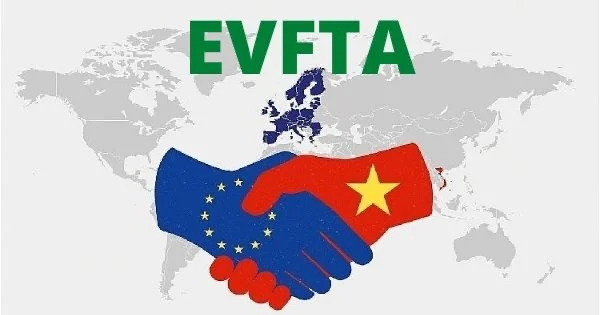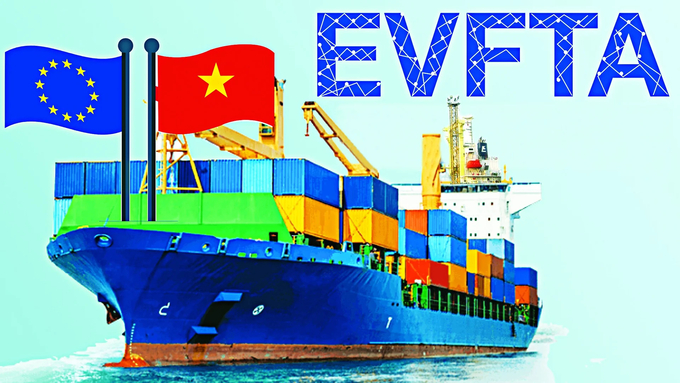May 20, 2025 | 23:40 GMT +7
May 20, 2025 | 23:40 GMT +7
Hotline: 0913.378.918
May 20, 2025 | 23:40 GMT +7
Hotline: 0913.378.918

The EU is currently one of the largest investors in Vietnam, with a total investment capital of up to 28 billion euros.
Approaching the 4th anniversary of the Vietnam - EU Free Trade Agreement (EVFTA) taking effect (August 1, 2020 - August 1, 2024), The European Business Association in Vietnam (EuroCham) conducted a Business Confidence Index (BCI) survey to review EVFTA opportunities and challenges for Vietnamese and European businesses.
From a trade perspective, EVFTA has significantly promoted Vietnam's exports to Europe, Vietnamese businesses have a clearer awareness of EVFTA compared to other trade agreements that Vietnam has signed.
Survey results show that 27% of surveyed businesses benefit from the EVFTA Agreement, shown by the growth of export turnover to the EU from 35 billion euros in 2019 to over 48 billion euros in 2023. This growth was recorded in many key industries, such as electronics, textiles, footwear, agricultural products and fisheries.
On the other hand, although exports grew strongly, Vietnam's imports from the EU grew more slowly, from only 11 billion Euros to 11.4 billion Euros in the same period. This led to a significant increase in the trade imbalance between the two sides.
However, EVFTA has helped enhance Vietnam's attractiveness to European investors. The EU is currently one of the largest investors in Vietnam, with a total investment capital of up to 28 billion Euros. In particular, in 2023, direct investment capital from the EU into Vietnam will continue to grow, contrary to the general downward trend globally.

EuroCham's survey results show that 27% of surveyed businesses benefit from the EVFTA Agreement.
Overall, EVFTA has made an important contribution to promoting economic relations between Vietnam and the EU, creating many new cooperation opportunities for both sides. However, the growing trade imbalance is a problem that needs attention and solutions.
The Business Confidence Index (BCI) survey shows that, although EVFTA has opened up many opportunities for European businesses in Vietnam, there are still some significant barriers that are holding back from taking full advantage of the benefits of this agreement.
Main obstacles include legal problems, complex regulations and inconsistency between localities on international standards, causing difficulties for businesses. Lack of understanding of the agreement when both businesses and state agencies do not fully understand the provisions of the EVFTA, leading to problems with customs, customs clearance procedures and valuation.
In addition, technical barriers, product certification and testing requirements are still limited. Policy changes, new tax regulations and technical barriers when entering the market also cause difficulties for businesses.
According to experts, EVFTA is a great opportunity but continuous efforts are still needed to overcome current difficulties. It is necessary to simplify administrative procedures, unify standards and increase support for businesses, especially small and medium enterprises. Resolving these issues will maximize the potential of EVFTA and bring benefits to both Vietnam and Europe.
Translated by Phuong Linh

(VAN) In 2024, over 295 million people across 53 countries and territories faced acute hunger—an increase of almost 14 million people compared to 2023, while the number of people facing catastrophic levels of hunger reached a record high.

(VAN) World Environment Day 2025 (June 5) carries the theme 'Beat Plastic Pollution' continuing to emphasize the global urgency of addressing the plastic waste crisis.

(VAN) This was the assessment shared by experts at the workshop titled 'Assessing the Role and Potential of Low-Emission Rice Production Systems in Vietnam,' held on the morning of May 19.

(VAN) Cai Rong Port is the fisheries control center of Quang Ninh, helping to monitor fishing vessels, combat IUU fishing, and remove the EC's 'yellow card'.

(VAN) The German Agricultural Society (DLG) explores the possibility of establishing a mechanization service center in Vietnam’s Mekong Delta to support farmers in accessing and utilizing advanced machinery.

(VAN) On May 16, the Department of Water Resources Management, in collaboration with the Food and Agriculture Organization of the United Nations (FAO), held a signing ceremony for the GEF-8 project document.

(VAN) Food safety, mechanization, vocational training, and market opening are key areas of cooperation expected between the Vietnamese Government and the Federal Republic of Germany.